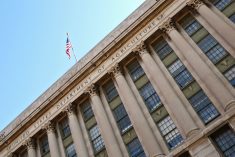Updated | Washington | Reuters — Major U.S. railroads and unions secured a tentative deal on Thursday after 20 hours of intense talks brokered by President Joe Biden’s administration to avert a rail shutdown that could have hit food and fuel supplies across the country and beyond.
Biden called the deal a “big win for America” and for tens of thousands of rail workers. Thanking business and labour, the Democratic president promised more worker-company agreements in the future.
“I’m optimistic that we can do this in other fields as well,” Biden said.
Read Also

U.S. livestock: Feeder cattle hit contract highs on tight supply
Chicago | Reuters – All Chicago Mercantile Exchange feeder cattle futures and most live cattle futures hit contract highs on…
“Unions and management can work together for the benefit of everyone,” Biden added.
If they accept the deal that was announced at about 5 a.m., workers whose pay had been frozen will win double-digit increases and will be allowed to seek certain types of medical care without fear of being punished, union leaders said. The agreement includes an immediate 14.1 per cent wage rise, the railroads said.
Unions, whose members bitterly rejected prior proposals, will now vote on the agreement. Even if those votes fail, a rail strike that could have happened as soon as a minute past midnight on Friday has been averted for several weeks due to the standard language included in such a deal, a person familiar with the negotiations said.
Biden’s Labor Secretary Marty Walsh hosted contract talks in Washington that ran for 20 consecutive hours between unions representing 115,000 workers and railroads including Union Pacific, BNSF, CSX, Norfolk Southern and Kansas City Southern, as well as U.S. track owned by Canadian National Railway (CN).
Officials are expected to host a news briefing later on Thursday.
Failing to reach a deal before the deadline would have cleared the way for workers to legally strike.
A rail shutdown could have frozen almost 30 per cent of U.S. cargo shipments by weight, stoked inflation, cost the U.S. economy as much as $2 billion per day and unleashed a cascade of transport woes affecting the U.S. energy, agriculture, manufacturing, healthcare and retail sectors (all figures US$).
U.S. natural gas futures dropped about nine per cent after soaring 10 per cent in the prior session; oil futures fell about four per cent to a one-week low. Diesel and gasoline futures also fell. Investors expected that a rail strike would have threatened coal supplies to power plants and boost demand for rival energy sources.
Amtrak, which runs passenger rail, said it will resume normal service on Friday after cancelling long-distance trains in anticipation of a strike.
The impact of a shutdown also would have stretched beyond U.S. borders because trains link the U.S. to Canada and Mexico and provide vital connections to massive ships that ferry goods from around the globe.
Negotiations between the companies and a dozen unions had stretched for more than two years, leading Biden to appoint an emergency board in July to help break the impasse. Biden personally called Walsh and negotiators on Wednesday evening to prod them toward a deal, telling them “once again to recognize the harm” that a shutdown would have on families, farmers and businesses, according to a person aware of the negotiations.
National Retail Federation CEO Matthew Shay thanked Biden’s administration for intervening, adding in a statement that his group is “relieved and cautiously optimistic.” Emily Skor, CEO of the biofuel trade group Growth Energy, also praised the deal and noted that much of the country’s ethanol moves by rail.
Freight railroads had halted transportation of hazardous goods, including chlorine for water purification and ammonia for fertilizer, as well as shipments of refrigerated food and other goods that use rail and at least one other mode of transport. Their goal was to prevent cargo from being stranded in unsafe locations.
Job cuts
The railroad industry slashed almost 30 per cent of its workforce over the last six years, cutting pay and other costs as they increased profits, stock buybacks and dividends for investors. Profits at billionaire Warren Buffett’s Berkshire Hathaway, which owns BNSF, rose 9.2 per cent in the most recent quarter to $1.7 billion.
The number of U.S. railway workers has dropped from over 600,000 in 1970 to about 150,000 in 2022, according to the Bureau of Labor Statistics, due technology and cost-cutting. The result is that many industry workers are on call at all hours, waiting to respond at short notice to work for days at a time.
The latest deal follows some earlier recommendations of the president’s emergency mediators. It includes a 24 per cent percent wage increase over a five-year period from 2020 through 2024 as well as $1,000 lump sum payments in each of five years.
Biden, who has called himself the most union-friendly president in history and attacked companies for raking in “excessive” profits, praised a deal he said would give workers “better pay, improved working conditions, and peace of mind around their health care costs.”
The president is not yet out of the woods when it comes to supply-chain labour issues. Some 22,000 union workers at 29 West Coast ports that handle almost 40 per cent of U.S. imports are also in high-stakes labour contract negotiations.
Administration officials wanted the disputes resolved ahead of November’s midterm elections that will determine whether Biden’s fellow Democrats retain control of Congress.
Senior congressional leaders had threatened to pass legislation imposing a resolution on the railroads and unions if the negotiations were not successful. U.S. House Speaker Nancy Pelosi praised the tentative agreement and said that Congress was “ready to act” but that “thankfully this action may not be necessary.”
— Reporting by Trevor Hunnicutt in Washington; additional reporting by Lisa Baertlein in Los Angeles, Steve Holland, David Shepardson and Susan Heavey in Washington, Stephanie Kelly in New York, and Jahnavi Nidumolu, Aishwarya Nair, Bansari Mayur Kamdar and Kannaki Deka in Bangalore.
















